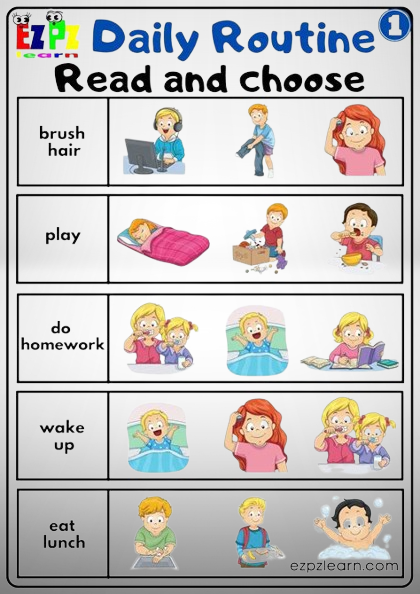Understanding the Importance of a Daily Routine
Establishing a daily routine is essential for optimizing productivity and enhancing overall well-being. A structured day has been shown to improve time management, allowing individuals to allocate sufficient time for various tasks, whether professional or personal. This enhanced organization often leads to increased efficiency, as individuals can focus their energies on prioritized activities without the distraction of unplanned interruptions.
The psychological benefits of maintaining a consistent daily routine are significant. Regular schedules often provide a sense of stability and predictability, which can reduce anxiety and stress. When individuals know what to expect throughout their day, they can prepare mentally, fostering a more positive mindset. Furthermore, routines can promote better mental health by instilling a sense of accomplishment as tasks are completed, leading to increased motivation and engagement in daily activities.
In addition to psychological advantages, physical health improvements can also arise from adhering to a daily routine. Consistent sleep and meal times contribute to better overall health, allowing the body to function optimally. Regularly scheduled exercise, often a component of a productive daily routine, can significantly enhance energy levels and reduce physical fatigue, enabling individuals to tackle their responsibilities with vigor.
Moreover, personal growth is significantly influenced by the establishment of a daily routine. By incorporating time for self-reflection, learning, and skill development into their schedule, individuals can foster continuous improvement. This intentional approach not only enhances productivity but also nurtures personal goals and aspirations, creating a fulfilling life experience.
Thus, the importance of a daily routine cannot be overstated. Not only does it enhance productivity and support mental well-being, but it also lays the foundation for a healthier lifestyle and continuous self-improvement.
Identifying Your Goals and Priorities
Establishing a productive daily routine begins with a clear understanding of both personal and professional goals. This initial step forms the foundation upon which other aspects of the routine will be built. To navigate this process effectively, individuals should engage in a period of self-reflection. Reflecting on what truly matters to you will help in uncovering core values and aspirations. Consider asking yourself questions such as: What do I want to achieve professionally? What personal milestones do I wish to reach? These inquiries are crucial, as they provide a framework for prioritizing tasks.

After identifying your major goals, the next step involves categorizing them based on importance and urgency. Utilizing a method such as the Eisenhower Matrix can be beneficial here; it allows you to separate tasks into four categories: urgent and important, important but not urgent, urgent but not important, and neither urgent nor important. By grading your goals in this manner, you can pinpoint which ones require immediate attention and which can be scheduled for later focus. Prioritization not only increases efficiency but aligns your daily activities with your long-term aspirations.
Furthermore, it is essential to remain flexible. Over time, personal and professional priorities may evolve, necessitating an adaptation of your daily routine. Regularly revisiting and reassessing your goals ensures that they continue to reflect who you are and what you want to achieve. This dynamic approach allows room for growth and change, welcoming new aspirations into your planning. By identifying your goals and priorities, you lay a solid groundwork for a routine that nurtures your ambitions while promoting overall productivity. Ultimately, this strategic focus will not only enhance your daily effectiveness but will also cultivate a fulfilling path toward achieving your life’s goals.
Analyzing Your Current Routine
To create a productive daily routine, it is vital to first analyze your existing habits and schedules. Begin by tracking your daily activities for at least a week. This can be achieved using a simple journal, digital app, or spreadsheet. Documenting your day might seem tedious initially, but it provides invaluable insights into how you spend your time. Include various categories such as work, leisure, exercise, and personal care. This detailed account will allow you to see exactly where your time is allocated.
Once you have a comprehensive overview of your daily activities, take a step back to reflect on this data. Identify hours in your day that are particularly productive and those that tend to be less effective. Pay close attention to patterns in your time usage. For instance, do you find that you are more focused in the morning but prone to distractions later in the day? Understanding these patterns will help inform the adjustments you need to make.
Moreover, assess the tasks that yield the most satisfaction and results versus those that seem to drain your energy without providing much benefit. This evaluation can highlight potential areas for improvement in your routine. Ask yourself what activities contribute positively to your well-being and productivity and which ones could be minimized or eliminated altogether.
After this analysis, consider setting specific goals for your new routine. Whether it’s to integrate more focused work periods, increase physical activity, or allocate time for personal interests, having targeted objectives will facilitate the transition to a more effective daily schedule. By thoughtfully evaluating your current habits, you can better tailor a routine that enhances productivity while also supporting your overall lifestyle needs.
Crafting Your Ideal Daily Routine

Creating a personalized daily routine that resonates with your individual lifestyle is essential for promoting productivity and enhancing overall well-being. To begin, it is advisable to analyze your daily responsibilities and identify the tasks that require attention. This introspection will help you allocate time effectively to crucial duties as well as personal interests.
One effective method for structuring your day is time blocking. This technique involves dividing your day into dedicated time slots for specific activities. For example, allocate focused periods for work-related tasks, interspersed with breaks to rejuvenate your mind. Use a calendar or planner to visually organize your schedule, ensuring that each time block serves a distinct purpose. This organization not only improves focus but also enables you to track productivity and adjust as necessary.
In crafting your routine, it’s vital to maintain a balance between work and personal life. Set boundaries for work hours and make a conscious effort to schedule time for relaxation, exercise, and socializing. This equilibrium fosters a healthier lifestyle and promotes mental clarity. Incorporating small breaks during your work hours can also significantly enhance your concentration and efficiency.
While structure is important, flexibility is equally crucial. Life can be unpredictable, and rigid adherence to a schedule may lead to stress. Be open to adjusting your routine as needed to accommodate unforeseen circumstances or changes in priorities. A successful daily routine should serve as a guide rather than a strict set of rules, allowing you to adapt as your circumstances evolve.
Ultimately, your ideal daily routine should reflect your personal values and goals, paving the way for an organized, fulfilling day. By following these steps, you can establish a routine that not only supports your productivity but also aligns with your lifestyle.
Incorporating Healthy Habits into Your Daily Routine
Building a productive daily routine necessitates the incorporation of healthy habits that positively influence both physical and mental well-being. Nutrition, exercise, and mental health play pivotal roles in determining energy levels, focus, and overall productivity. To achieve a balanced lifestyle, it is essential to prioritize these elements within your daily schedule.
Starting with nutrition, consuming a balanced diet rich in whole foods can significantly impact your daily routine. Foods high in nutrients, such as fruits, vegetables, whole grains, lean proteins, and healthy fats, provide the necessary energy to sustain focus throughout the day. Meal planning and preparation can help in avoiding unhealthy snacking, which often leads to energy crashes. Additionally, staying hydrated is crucial; water enhances cognitive function and can help mitigate fatigue. Aim to drink enough water throughout the day to maintain optimal hydration levels.
Physical exercise is another critical component of a productive routine. Regular activity can improve mood, enhance cognitive performance, and increase energy levels. Integrating exercise into your day doesn’t require a lengthy commitment; even short bursts of physical activity, such as walking or stretching between tasks, can be beneficial. Aiming for at least 150 minutes of moderate aerobic activity weekly can help maintain your energy levels and focus.
Mental well-being is equally important for an effective daily routine. Practices such as mindfulness, meditation, or even journaling can help manage stress and promote clarity of thought. Allocate a few minutes daily for activities that encourage relaxation and mental health. By nurturing both body and mind, you create a solid foundation that supports sustained productivity and overall well-being.
Utilizing Tools and Resources for Your Daily Routine
In today’s fast-paced environment, optimizing a daily routine can be challenging without the right tools and resources. A plethora of planners and digital applications exist that are specifically designed to help individuals structure their day more effectively. One of the most traditional yet effective tools is the physical planner, which can assist in organizing tasks, setting priorities, and keeping track of important deadlines. Many people find that writing down their tasks enhances focus and accountability.
In addition to physical planners, digital tools have gained significant popularity due to their convenience and accessibility. Applications such as Trello, Asana, and Todoist provide various features for task management, allowing users to break down their daily activities into manageable steps. These applications often support collaboration, which can be particularly useful for team projects or accountability partnerships, making it easier to track progress collectively.
Furthermore, habit-forming applications like Habitica and Streaks turn routine-building into a game, encouraging users to develop consistency through rewards and visual progress indicators. These apps cater to building healthier habits while also contributing to the establishment of an effective daily routine. By integrating reminders and notifications, they help individuals stay on track without being overwhelmed by their overall goals.
For those who prefer a holistic approach, tools such as meditation apps and mindfulness resources can also play a crucial role in enhancing productivity. These applications help in managing stress and promoting mental clarity, which are often essential for maintaining focus throughout the day. By utilizing a combination of these planners, digital tools, and habit-forming applications, individuals can customize a daily routine that not only works for them but also increases overall productivity and accountability.
Establishing Boundaries and Time Management

Creating a productive daily routine requires a deliberate approach to establishing boundaries and managing time effectively. Boundaries serve as the framework that protects personal time and energy, allowing individuals to focus on tasks that matter most. To cultivate these boundaries, it is essential to recognize the demands on one’s time and to conscientiously allocate it to priority activities. This involves embracing the power of “no.” By saying no to tasks or responsibilities that do not align with personal goals or values, individuals can preserve their time for activities that truly enhance their productivity.
Effective time management also hinges on the strategic allocation of specific time slots for various tasks throughout the day. This practice not only fosters a sense of organization but also allows for a clearer understanding of what can realistically be accomplished within a given timeframe. It is advisable to categorize tasks based on their urgency and importance, and to use tools such as calendars or task management apps to schedule daily activities. By visually representing tasks and deadlines, individuals can avoid overcommitting and better manage their energy levels.
Integrating purposeful breaks into the daily routine is another critical aspect of time management. Regular pauses during work allow the mind to recharge, promoting sustained productivity. Additionally, establishing a designated workspace can further support concentration and signal to others that it is time for undisturbed focus. Prioritizing activities that contribute to personal and professional growth not only enhances overall fulfillment but also reinforces boundaries that safeguard personal time. Ultimately, by combining these strategies with a commitment to maintaining balance, individuals can create a daily routine that is both productive and rewarding.
Staying Motivated and Committed to Your Daily Routine
Maintaining motivation and commitment to a daily routine is crucial for achieving long-term goals and ensuring productivity. Celebrating small wins is an effective strategy that can significantly enhance motivation. Each minor achievement acts as a milestone, providing a sense of progress that fuels further effort. By acknowledging these victories, individuals can reinforce positive behaviors, making it easier to stick to their routines. Whether it’s completing a morning workout or finishing a task ahead of schedule, celebrating these moments helps create a positive feedback loop that encourages persistence.
In addition to celebrating achievements, it is essential to periodically revitalize one’s goals. Setting a routine is not a one-size-fits-all approach; personal and professional circumstances change, which may necessitate adjustments to goals and schedules. Reevaluating and adapting objectives not only maintains engagement but also helps in aligning daily activities with current aspirations. This process of reflection can reignite motivation and enthusiasm, making the daily routine feel fresh and relevant.
Accountability partners can play a pivotal role in keeping one on track with their daily routines. Sharing goals with someone else creates a sense of responsibility and support. An accountability partner can provide encouragement, help identify obstacles, and offer insights on how to overcome challenges. The collaboration between two individuals committed to their routines can lead to enhanced motivation, as both parties hold one another accountable for their progress.
Obstacles and setbacks are inevitable when adhering to a routine. Thus, developing strategies to navigate these challenges is essential. A common tactic is to focus on flexibility, allowing for adjustments when unexpected circumstances arise. Emphasizing resilience and the ability to get back on track after a setback is vital in maintaining commitment to a daily routine. By implementing these practices, individuals can foster a strong foundation for motivation that sustains their efforts over time.
Reviewing and Adjusting Your Daily Routine
Establishing a productive daily routine is a pivotal step towards achieving your personal and professional goals. However, as life circumstances evolve, it is essential to regularly review and adjust your daily routine accordingly. This ongoing evaluation ensures that your routine remains relevant and effective in fostering personal growth and productivity.
To effectively evaluate the effectiveness of your routine, consider setting aside time each week or month to reflect on your daily habits and productivity levels. During this review process, ask yourself pertinent questions such as: Are you meeting your goals? Do you feel energized or drained at the end of the day? Are there recurrent obstacles that hinder your productivity? An honest assessment of these factors will provide valuable insight into how your daily routine is serving you.
As you identify areas for improvement, adapt your routine to accommodate new challenges or aspirations. For instance, if you find that your current schedule does not allow adequate time for exercise, consider reorganizing your daily tasks to prioritize physical health. Embracing flexibility in your routine will not only improve your productivity but will also foster a sense of control over your daily life.
Furthermore, maintaining a growth mindset is crucial during this adjustment period. Recognize that productivity is not a static state but rather an ongoing process that requires adaptation and sometimes, a complete overhaul. Keep an open mind towards experimenting with new strategies, techniques, or tools that might enhance your daily routine. This attitude will ultimately assist you in navigating the complexities of life while staying committed to your productivity goals.
Regularly reviewing and adjusting your daily routine will empower you to stay aligned with your evolving objectives and ensure continuous personal development. Embrace these changes with the understanding that productivity is a journey, not a destination.



